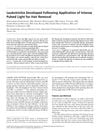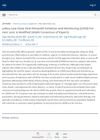 4 citations,
November 2020 in “Journal of Cosmetic Dermatology”
4 citations,
November 2020 in “Journal of Cosmetic Dermatology” Most Facebook posts about hair loss treatments are promotional and not medically supported, with better quality information found on YouTube.
 July 2021 in “British Journal of Dermatology”
July 2021 in “British Journal of Dermatology” Low testosterone levels may contribute to female pattern hair loss in men.

Hair transplantation can effectively treat female pattern hair loss if done correctly, considering factors like patient's preferred hairstyle and proper use of techniques and medications.
 November 2024 in “Skin Health and Disease”
November 2024 in “Skin Health and Disease” Minoxidil is effective for promoting hair growth and has various dermatological uses.
 January 2022 in “Springer eBooks”
January 2022 in “Springer eBooks” Platelet-rich plasma therapy helps increase hair thickness and slow hair loss.
 1 citations,
March 2019 in “Actas Dermo-Sifiliográficas”
1 citations,
March 2019 in “Actas Dermo-Sifiliográficas” New cancer treatments are less harmful to hair but can still cause hair loss, color, shape, and growth changes.

Platelet-rich plasma therapy might help treat some kinds of hair loss.
 7 citations,
September 2014 in “Beni-Suef University Journal of Basic and Applied Sciences”
7 citations,
September 2014 in “Beni-Suef University Journal of Basic and Applied Sciences” Cuscuta reflexa extracts and an isolate promoted hair growth and could be natural treatments for hair loss.
 September 1997 in “JEADV. Journal of the European Academy of Dermatology and Venereology/Journal of the European Academy of Dermatology and Venereology”
September 1997 in “JEADV. Journal of the European Academy of Dermatology and Venereology/Journal of the European Academy of Dermatology and Venereology” The document concludes that treatments like oral anti-androgens, minoxidil, and topical spironolactone can be effective for hair loss in men and women.
 4 citations,
September 2020 in “Journal of Cosmetic Dermatology”
4 citations,
September 2020 in “Journal of Cosmetic Dermatology” PRP treatment significantly increased hair density and thickness in male hair loss.
 1 citations,
January 2020 in “Aesthetic Surgery Journal”
1 citations,
January 2020 in “Aesthetic Surgery Journal” Platelet-rich plasma and stem cell therapies are accepted treatments for hair restoration, with specific protocols recommended for best results, but more standardization is needed in stem cell use.
 33 citations,
July 2020 in “Journal of The American Academy of Dermatology”
33 citations,
July 2020 in “Journal of The American Academy of Dermatology” PRP treatment improves hair density and thickness for alopecia, but needs more research.
 14 citations,
August 2019 in “Journal of Dermatological Treatment”
14 citations,
August 2019 in “Journal of Dermatological Treatment” 10% minoxidil solution better promotes hair growth and reduces hair loss without significant side effects.
 5 citations,
March 2021 in “International Journal of Dermatology”
5 citations,
March 2021 in “International Journal of Dermatology” Biotin supplementation during isotretinoin treatment for acne may help maintain skin hydration and improve hair growth.
 July 2002 in “Dermatologic Surgery”
July 2002 in “Dermatologic Surgery” Some people's hair turned white or gray after using intense pulsed light for hair removal, and for some, it was permanent.
 46 citations,
October 2012 in “Dermatologic Clinics”
46 citations,
October 2012 in “Dermatologic Clinics” Female pattern hair loss diagnosed by scalp appearance, treated with combined therapies and targeted approaches.
Topical 5% minoxidil is safe and effective for treating hair loss in Korean men.
 September 2023 in “Journal of the Dermatology Nurses’ Association”
September 2023 in “Journal of the Dermatology Nurses’ Association” Platelet-Rich Plasma (PRP) may be a safe and effective treatment for hair loss caused by Alopecia Areata.
May 2020 in “Journal of the Dermatology Nurses’ Association” The multimedia tool improved patient understanding of PRP treatment for hair loss.
April 2016 in “Dermatología Revista Mexicana” The effectiveness of APRP for hair loss is unclear due to limited data.

Human scalp hair follicles have PGE2 and its receptors, which might affect hair growth.
3 citations,
December 2010 in “Annals of tropical paediatrics” A boy's hair loss and bone issues improved with specific vitamin D treatment and calcium.
January 2021 in “Springer eBooks” Combining PRP with other treatments can improve hair loss outcomes.
 1 citations,
January 2015 in “Springer eBooks”
1 citations,
January 2015 in “Springer eBooks” AGA is a common hair loss disorder, and early diagnosis and treatment with minoxidil or finasteride can help reduce emotional distress.
 September 2024 in “Journal of the American Academy of Dermatology”
September 2024 in “Journal of the American Academy of Dermatology” Botulinum toxin is not effective for treating male hair loss.
 61 citations,
July 2011 in “PLOS ONE”
61 citations,
July 2011 in “PLOS ONE” Spermidine may help reduce hair loss and deserves further testing as a treatment.
 December 2023 in “JAAD international”
December 2023 in “JAAD international” Teledermatology is highly effective for diagnosing and managing hair loss.
 18 citations,
January 2020 in “Indian Dermatology Online Journal”
18 citations,
January 2020 in “Indian Dermatology Online Journal” Platelet-rich plasma shows potential for hair loss and skin rejuvenation but needs more research for widespread use.
 June 2024 in “Frontiers in pharmacology”
June 2024 in “Frontiers in pharmacology” 2-deoxy-D-ribose gel may help regrow hair in cases of hair loss.
 September 2024 in “Journal of the American Academy of Dermatology”
September 2024 in “Journal of the American Academy of Dermatology” Experts agree on guidelines for safely using low-dose oral minoxidil to treat hair loss.
























